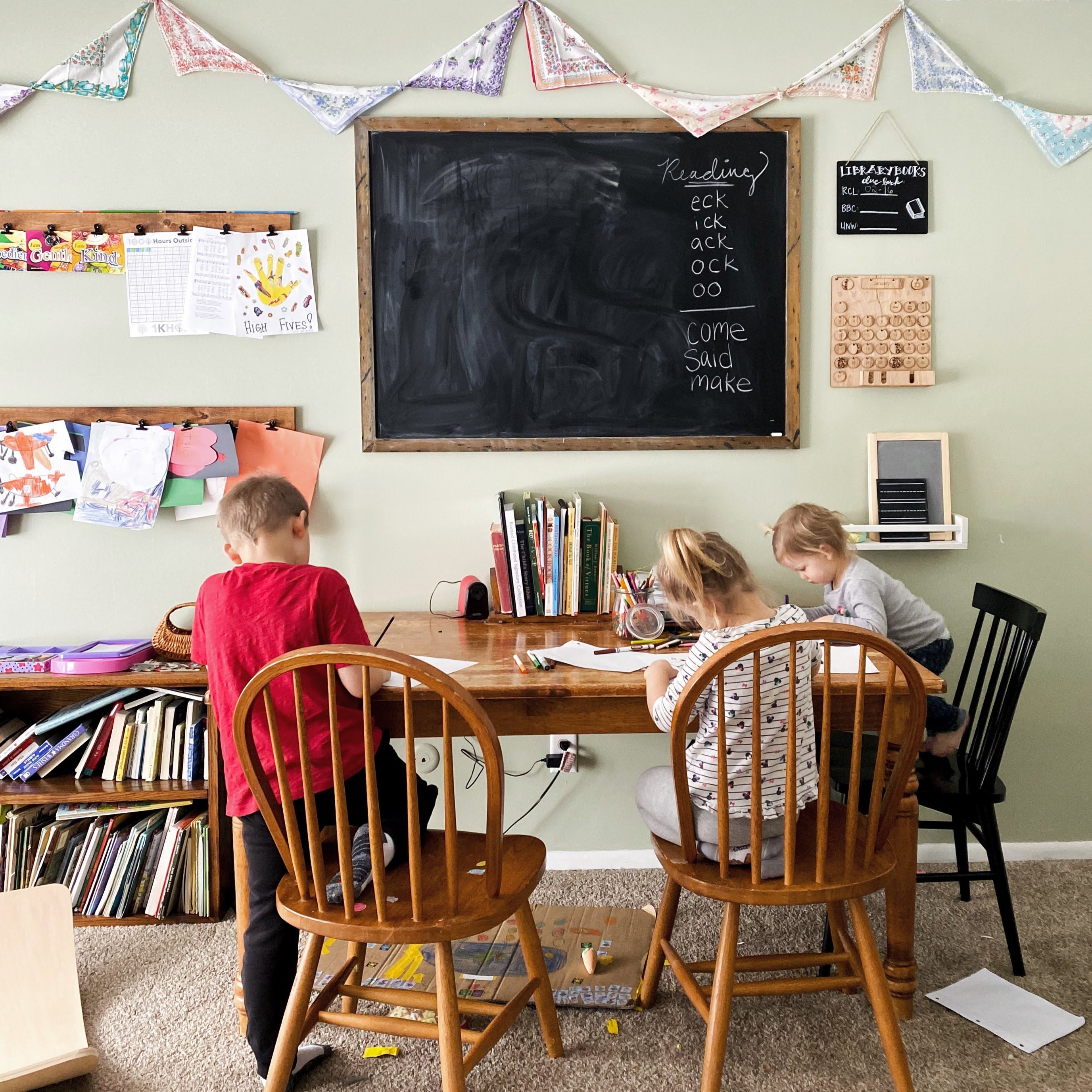If it hasn't happened to you yet, it will. The homeschool inquisition.
It can take many forms- at the grocery check out, the dentist office, or from a well-meaning relative- but especially over the holidays, it is very common for conversations to steer into this territory.
No matter who is questioning you, giving an answer that is full of grace can go a long way. And a little information doesn't hurt either!
10 Homeschooling Questions (Others Have For You) and How to Answer Them
First things first: you don't need to defend yourself. Sometimes just listening to someone is enough. They may just need to hear about your enjoyment of of your children and what a pleasure it is to be together. You are the parent and you have the authority to choose for your child their best educational path. Remember that, that is a good enough reason to homeschool by itself.
But many times these questions come from a heart of a loved one who really desires to learn and who deeply cares about your child. Sometimes a conversation can bring about a shared understanding and deeper care for one another. So let's talk about the 10 main questions people present to homeschooling families and a gracious, yet explanatory answer for each.
Socialization
I actually love this question, because the people who pose it usually care about your children and want them to have community, friends and be "normal". This is a good desire! But, they usually also don't know many families who homeschool, otherwise they would know how much of a non-issue this is.
You can respond with a question. "What do you mean by socialized?" It's good to understand what they mean by socialization. Typically it boils down to the fact that the questioner believes homeschooled children are "weird".
Many families are proud of their homeschool kids not being "normal" or typical so you can highlight the good about being different from other peers. You can mention that there are "weird" kids everywhere, in every type of school setting.

Also, there are many social aspects in the school system that homeschool families are avoiding, so you can talk about any concerns you have and the social benefits homeschooling offers.
I like to share about the social opportunities we do have as a homeschooling family and that (especially for young children) they benefit of having parents present for many of these opportunities. We get to know many kids in the context of their whole family, which is so special.
Research has shown that children, no matter how they're educated, are most socially/behaviorally influenced by their parents, so our educational choice isn't the major defining factor in personality or social skills.
Teacher Qualifications
This is usually a question that stems from just being uneducated about homeschool laws or qualifications of the educator. Feel free to share about what the law requires in your area.
Real-World Preparation
Is school the real world? Are schools adequately preparing kids for the "real world"? We're preparing our children for the real world by living in it (rather than segregating them in a same-age classroom all day). Feel free to share about the life skills you're teaching your children and the real world opportunities and experiences homeschooling gives them.
Educational Gaps
There is no education that is without gaps. Embrace the fact that your child's education will have gaps. But so does the education everyone receives!
Financial Concerns
There is a perception, real or imagined, that homeschooling costs a lot of money and that all homeschool families are living in poverty or are "privileged". It is reasonable for someone to have the question of how you can afford homeschooling.
You can take this question as an opportunity to explain the real expenses of homeschooling (which are minimal), compared to the cost of school supplies, field trips, extracurricular activities etc. within the school system.
But honestly, this question is very personal and you shouldn't feel the need to justify or explain your financial decisions to anyone except those involved (namely your co-parent/spouse).
Accountability or Lack There Of
Many people are worried that there is little to no oversight from a governing body, when it comes to homeschooling. They believe that homeschool kids "fall behind". You can explain the laws, if there are any, in your area that you need to adhere to or any of the public services offered to your child should you need to access them. But you can also share about the recent research coming out from the school system in regards to illiteracy, math competencies and college readiness. It's pretty bleak.

Lack of Diverse Ideas
The cool thing about homeschooling is that parents are shaping their child's education. You get to use whatever resources you'd like to, to present new and diverse ideas as your child is ready to encounter them. Everything we teach our children (whether homeschooling or not) is from a worldview, so some of this is unavoidable. And it should be. We should be passing along our values and worldview to our children!
The public school system is not neutral in the ideas it presents, so no matter what form of education you choose for your child, there is limited diversity. You can ask for further information about what ideas or relationships they're referencing for more insights into how to dialogue about this question.
Lack of Services/IEPs
If this question is coming up specifically because of your child and his or her needs, that usually means you have people who care about your child and their education. That is great news! You can give specifics of your plan for your child or you can also choose to give a broad overview.
If you know about IEPs, you will know that most plans begin with the same outline of accommodations. Some of these might be extended time to complete assignments, variations in how instruction is delivered to the child or changes in the child's environment (such as seating accommodations, noise level reductions or workspace adaptations).

The beauty of homeschooling is that it is, by nature, full of many of these accommodations. A homeschooled child doesn't have to feel "different" or "other" for any tweaks they need to learn and work best, since homeschooling gives them an individualized education from the beginning.
If a child need further services, they can often still access these through the school system, community or even online services via zoom etc.
College Preparation
If your child is young, this question can be answered with a simple "We will deal with that as we get closer" since college preparation is a long way off for a second grader.
But there is a lot of research out there comparing homeschool kids vs. public school kids in their college readiness and it clearly comes out in favor of homeschooled children. They usually score higher on the ACT/SAT, have higher graduation rates and higher collegiate GPAs. A little research on Google Scholar or a simple google search will show lots of studies on this topic.
If you have kids in high school you could address specific questions about course load, how you make a transcript or what universities your child is considering and their entrance requirements, if you choose. This may be a question people are wondering about because they're unfamiliar with the process.

Isolation
Isolation can be a real concern, especially if you live rurally. Homeschooling does take extra intentionality to find community and friendship, and it's okay to be honest about this being a challenge. But a challenge doesn't make it impossible.
Feel free to share about the fact that homeschool kids aren't sitting in a desk in the basement all day (like some people perceive), but about all of the ways you are out living in the world and engaging in your community, even if it's a small community, and about the long-lasting value of sibling relationships over peers.
I think the heart of this question is the fear that kids are going to be lonely and that they will not have any autonomy to change that, so if this is the case, it would be great to address that concern directly. The reality is too that most kids experience periods and feelings of loneliness during adolescence. regardless of their educational pathway, so it's helpful to make clear that you're there to support, encourage and care for your child if and when they navigate this part of adolescence.
To Keep In Mind....
With every question, you can choose whether or not you want to answer it, but I hope this gives you a helpful starting point. I like to think that people asking questions are inquisitive because they're making conversation and not because they're being antagonistic.
All of these are valid questions and concerns, especially from one who has not be exposed to homeschooling much. It's helpful to remember that there may have been a time in your life where you also had similar questions or concerns and that others aren't coming from the same experience or perspective as you. And it always helps to choose to answer with kindness, knowing that often there are the listening ears of your children nearby.
Happy Homeschooling!



